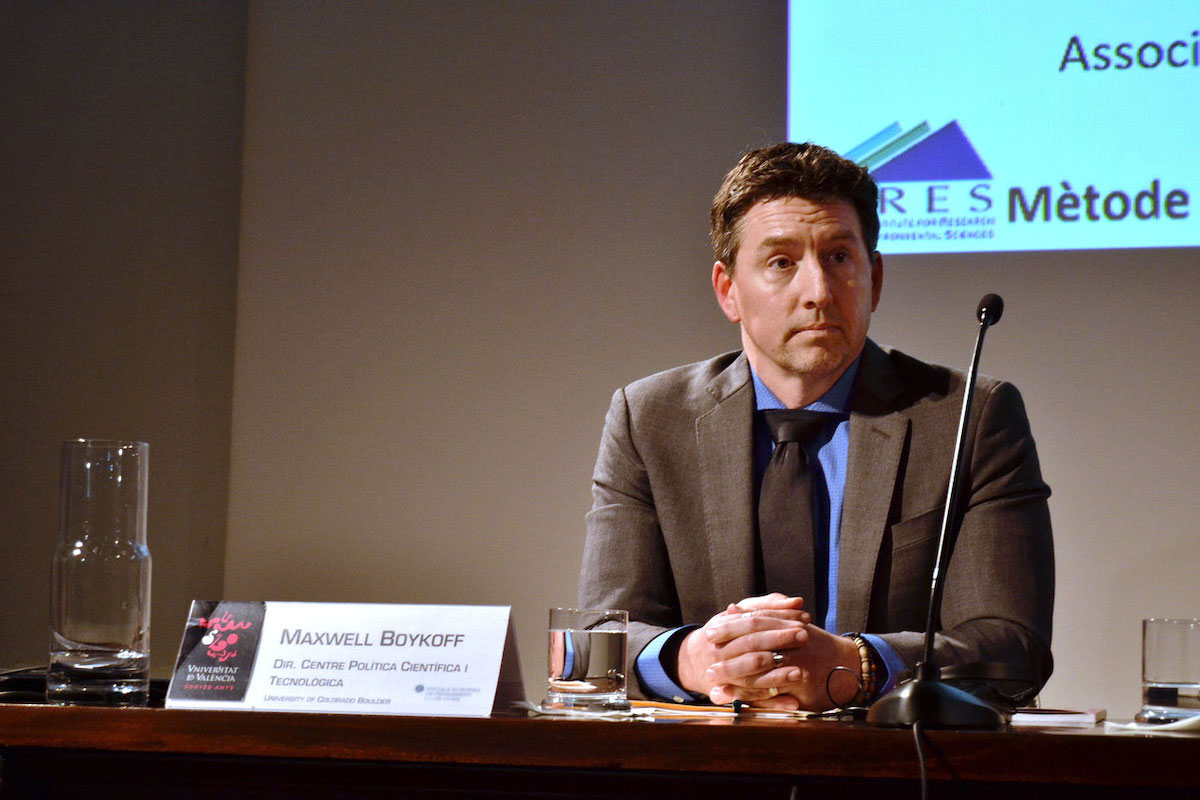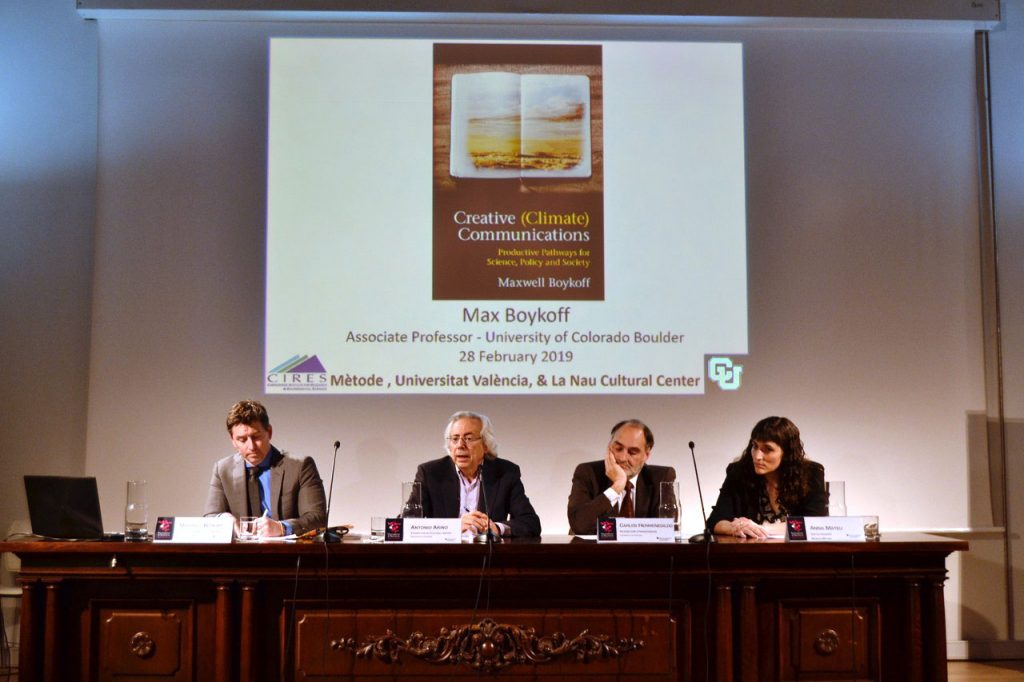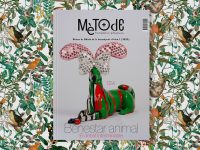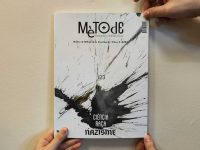Humour and creativity to communicate climate change
Maxwell Boykoff discusses the keys to innovative and effective scientific communication with his lecture at the La Nau Cultural Centre

«We do not need a silver bullet for climate change communication, but a silver buckshot.» This was the conclusion of the lecture «Creative (Climate) Communications» by Maxwell Boykoff, first speaker of the series «The great challenges of science», organised by the journal Mètode and the Escola Europea de Pensament Lluís Vives, with which the magazine starts the celebrations for its 100th issue. The professor of the University of Colorado-Boulder shared with the gathered audience, on Thursday 28 February in the Main Hall of the La Nau Cultural Centre, his experience communicating climate change from innovation, creativity, and humour. The vice-principal for Culture and Sport Antonio Ariño and the vice-principal for Research Carlos Hermenegildo were responsible for welcoming the attendees to the event and for putting it into context within the celebration of the 20 years of La Nau and the 100 issues of the journal Mètode, while the editor-in-chief of the journal, Anna Mateu, introduced Maxwell Boykoff and his career in the communication of climate change.
One of the main ideas defended by Maxwell Boykoff is the need to reach out to different audiences through different strategies. In this regard, he pointed out the gap in the deficit theory, which has traditionally considered that the transfer of information from an intellectual elite to the public is essential so that the latter can take appropriate decisions, but «surely many of those of you who are here are very very well informed about climate change and yet fall into contradictory behaviour.» Therefore, he emphasised that it is essential to know the different types of public whom we address and to adapt the message.

This, however, does not mean «to dumb down the level» of the explanations either, as, according to Boykoff, too many scientists have considered it necessary to approach the general public. What is needed, in any case, is «to smarten up» communicative sophistication, to discover the way to enhance different degrees of audience commitment to climate using creative and unusual tools such as images or music. Professor Boykoff cited, as an example of this diversity of ways of communicating, the participation of scientists in protests and demonstrations for climate in the street, and the use of banners and protest messages with a tinge of humour that often attract attention and are reproduced by media and social networks.
Doing humour with climate change
Humour was precisely one of the tools vindicated by professor Boykoff in his talk: «Humour has not been used very much [for scientific communication], but it is a great way of connecting ideas to the people. Among other things, it can find cracks in certain arguments, and it also can reveal truths», he said, just before introducing the initiative «Stand Up for Climate Change» within the project of the University of Colorado-Boulder «Inside the Greenhouse», of which professor Boykoff is co-director. This project was created to explore how «one can communicate aspects of climate change through theatre, cinema, art, expressive art, television», and also to «evaluate and extract effective methods for multi-modal communication of climate».
«One of the main ideas defended by Maxwell Boykoff is the need to reach out to different audiences through different strategies»
«Stand Up for Climate Change» (a pun with the concepts standing up for something and stand-up comedy), is a contest of humour monologues on climate change focused on students that has already held three editions since 2016, and which was reproduced in nine countries with very interesting results on how to encourage the public to engage the fight against climate change. As possible negative aspects, Professor Boykoff said that this type of performances can always bear the considerable risk of individualising the issue too much and causing a feeling of anxiety in the audience. However, this type of initiative, when well-focused, can help to empower people and make them understand what tools they have at their disposal in order to become involved.
Appropriate formulas for each audience
Scientific communication, therefore, always has to worry about «the audience and the time in which it lives». Moreover, all the strategies that arise have to be continuously revised, as Boykoff insisted: «We need to evaluate consistently creative ways to communicate climate change so that it is possible to provide guides and useful resources to many audiences.» In this line, professor Boykoff took the opportunity to present his book Creative (climate) communications: Pathways for science, policy and society, a compilation of «guidelines, rules, and lessons» for creative and effective communication, «transferable» to communication strategies for other social, cultural, political, and of course, scientific issues.
«Scientific communication always has to worry about “the audience and the time in which it lives“»
Thus, he highlighted five fundamental rules to communicate any topic related to science: authenticity, ambition, rigour, imagination, and courage. These rules were transformed into five specific guidelines for the communication of climate change consisting of, first, finding common ground with the general public regarding climate change. Second, emphasising how this affects us here and now in our daily lives. Thirdly, pointing out how the commitment in the fight against climate change makes our lives better. Fourthly, creatively empowering persons to carry out significant actions for climate. Finally, we should always smarten up climate change communication, instead of dumbing it down. All this, however, trying not to promote a fundamentally individual commitment which could lead to a situation of stagnation or paralysis.
Professor Boykoff concluded his talk with a warning against nostalgia and idealisation of the past, a very tempting option during our times. Above all, he insisted that we need not constrain or belittle new generations, that they should feel more empowered regarding all the challenges which they will have to deal with in the short and medium term.
Complete video of the presentation.





